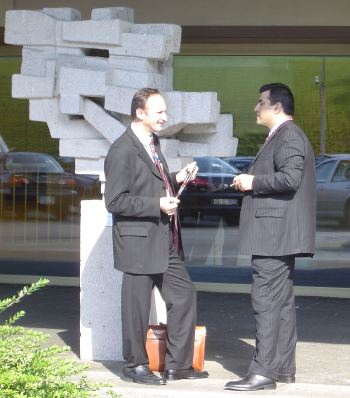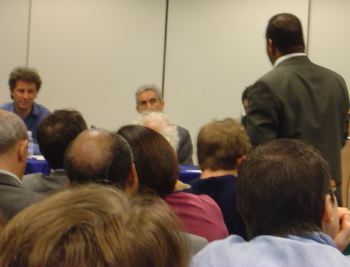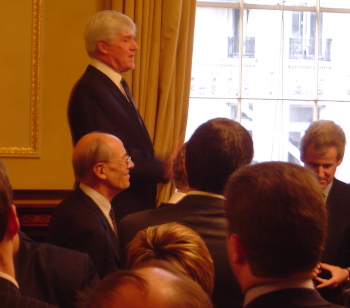We are developing the social individualist meta-context for the future. From the very serious to the extremely frivolous... lets see what is on the mind of the Samizdata people.
Samizdata, derived from Samizdat /n. - a system of clandestine publication of banned literature in the USSR [Russ.,= self-publishing house]
|
Good luck to Iyad Allawi, the man who will, inshallah, be Iraq’s next Prime Minister.
Hopefully he will be given the external support he needs to stabilise the security situation sufficiently to allow more internal solutions to develop. Although it would be difficult to underestimate the struggle ahead, the situation is far from the hopeless one often portrayed by people with axes to grind which have very littloe to do with Iraq.
Gabriel Syme and I (and a certain Frogman) have been away from our keyboards for a few days because we have in Geneva, adding our efforts to that most worthy of activist groups, Bureaucrash, on the occasion of the first outing of Eurocrash in Switzerland. The target for our attentions was the Fifty-seventh World Health Assembly held by that hotbed of socialist obscurantism, the World Health Organisation.
The simple message of the Eurocrash was not something all too many of the people participating in that tax funded Tranzi event wanted to hear: Capitalism Heals/Socialism Kills
 Step One: Infiltrate the WHO events by getting a badge… Step One: Infiltrate the WHO events by getting a badge…

Step Two: wander over to the UN Palace of Nations…

Step Three: take embarrassing pictures of UN type folks smoking in front of where WHA sessions are going on…

Step Four: hand out pro-capitalist leaflets designed to demonstrate that there is more than one point of view…

Step Five: get run out of town by UN cops…
Although it was all only a very small fly in their ointment, it was all worth it just to see the incredulous expression of people at the notion of pro-capitalist demonstrations on UN property.
The next round of jolly japes immediately afterwards was to crash the screening of a new film by socialist activist German Velasquez, called ‘Profits or Life?‘, which criticises attempt to uphold the intellectual property rights of pharmaceutical companies who have developed many life saving drugs. Velasquez was supported on a Q&A panel afterwards by Marxist activist Carlos Correa. Twenty or so Crashers turned up to to ask a few rather awkward questions and distribute some rather clever leaflets which dissented from the movie’s message…

Crasher Niger Innes asks why, given that the
panel was representing itself as the voice of the
poor in Africa, there were no Africans on the panel? Ouch.

Crasher Stefan Metzeler points out that as the
majority of drugs are not under patent anyway,
blaming intellectual property rights for the Third World’s
health problems, rather than massive regulatory statism and
a lack of free trade, is rather idiotic…
And then who should appear in the audience but Dr. Harvey Bale, who Velasquez’s movie has cast as ‘the ugly American Bad Guy on the side of the evil pharmaceutical companies’. Far from being the sinister character ‘Profits or Life?‘ portrayed him to be, he turns out to be an urbane and very articulate fellow as he addressed the point which had been made on-screen. Never have I heard a man demolish another man’s arguments so systematically and yet remain utterly charming and polite.

And then Dr. Harvey Bale, the Director General
of the Geneva-based International Federation of Pharmaceutical
Manufacturers Associations had a few words…
And with that, the Crashers vanished into the surroundings… well, into Geneva actually in search of food and drink. A fairly interesting time was had by all and I found the event a very useful networking opportunity as well.
The furore over blog publishing software Movable Type‘s new licence arrangements continues to send shockwaves across the blogosphere. As it happens we were considering moving away from MT to a different php based content management system for Samizdata.net anyway (and we certainly will now)… but I think that what is really interesting about this incident is that trackback has truly come of age.
Like many very thoughtful bloggers, I think SixApart have just taken their best weapon, pointed it right at their foot and pulled the trigger.
But what really interests me is that the storm of hostile trackbacks have provided SixApart with magnificent and unequivocal information on what their market really thinks. The business implications for spontaneous feedback like that are almost inestimable. Of course that does not mean SixApart will correctly respond to the explosion at the core of their business model, but the fact is that the information they need to do exactly that has just landed on them in a very helpful and rather spectacular manner.
Trackback has come of age. It is now an indispensable feature for any commercially oriented blog.
British troops have been closing to bayonet range in fights against company sized units of Islamist militiamen in Iraq:
Scottish troops fixed bayonets and fought hand to hand with a Shi’ite militia in southern Iraq in one of their fiercest clashes since the war was declared more than a year ago, it was reported last night. Soldiers from the Argyll and Sutherland Highlanders mounted what were described as “classic infantry assaults” on firing and mortar positions held by more than 100 fighters loyal to the outlawed cleric Moqtada al-Sadr, according to military sources.
And in support of Britian’s soldiers, some Members of Parliament have called not for rapid reinforcement to be sent but rather for a vote to decide if the Blair government should send any additional troops at all.
It is one thing to oppose British involvement in Iraq in its entirety, it is quite another for politicos to take positions which places UK forces in danger by denying them support without having the courage to just come out and say that Britain forces should just be ordered back to the UK in order to allow Tony Blair to be deposed by more suitably leftward statists. It is unedifying to see the likes of Robin Cook playing political games in Westminster when people are fixing bayonets in Basra and calling for support.
Either support and reinforce the army or (bizarrely) declare defeat and withdraw them.
If reading about the failing of Robert Fisk and being hunted in a pub by ‘peace’ activist harridans if your cup of tea (it certainly is mine), then you could do worse than read the compelling and pleasingly off-beat Blog Irish:
Having exhausted her ignorance on the subject of Eamo, she suggested that we discuss the Israeli/Palestinian conflict. We suggested that after five pints that was probably not a good idea.
With no further ado, she started screeching at the top of her lungs at us. We walked to the other end of the pub, and she followed, still screeching. The pub patrons and staff took no notice whatsoever. She left, and returned five minutes later with five angry women who were apparently going to show us the error of our ways. They searched through the pub, and though we were sitting near the entrance, affected not to see us, and left.
It is a funny old world.
One reason for the limited output of bloggage from some of us tonight was that several of us went to an extremely well attended party. This was hosted by the Adam Smith Institute in order to celebrate the 25th anniversary of the start of the Thatcher Revolution. The event at the Oxford and Cambridge Club in London.
It is easy today to look back and scoff at what went wrong in those days, but those of us who lived through the steady economic and social collapse wrought by the likes of Jim Callaghan, Harold Wilson and Ted Heath, I have no hesitation describing what Thatcher presided over, which was nothing less than turning the tide of socialism, as a glorious revolution.
We are older and wiser now and all too aware of the missed opportunities and wrong turns of that era, but credit where credit is due. The future could have been very much darker indeed without Margaret Thatcher.
Update: More pictures on the Adam Smith Institute blog
It is very disappointing that some officers in the British and US military seem to have lost control over their troops in the manner that the reports in the media are highlighting. No, I am not about to join the ludicrous cat’s chorus equating the Allied forces with Saddam’s institutional mass murderers, but no one who actually cares about the mess in Iraq eventually ending the right way up can be anything less than dismayed.
Certainly I understand how the stresses of urban combat can lead to itchy trigger fingers but for the custodians of prisoners to have allowed this to happen is completely impossible to justify. That the perpetrators felt the need to take pictures of their criminal actions suggests that we are dealing with your common-or-garden variety of psychopath rather than people ‘merely’ brutalised into callous indifference or shooting first/asking questions later due to being in a combat zone.
The only way this can be salvaged is for the clear difference between the torturers of Iraq’s ancien regime and the US/UK’s militaries to me made starkly clear: the people responsible must be subjected to swift and decisive military justice.
And while we are on the subject of ‘what the military should be doing’, can anyone please explain why the Italians who were kidnapped in Iraq the other day had been disarmed by US troops at a checkpoint? Whilst the fighting against the Islamo-fascists seems to be progressing, in other ways the last few days have hardly been days to bask in the glow of a job being well done by some of ‘our boys’, which is a great pity indeed.
I cannot help thinking that whilst the leadership in-theatre did well during the conventional conflict, perhaps a far reaching change in local military commanders might not go amiss as it is not enough to just manage the battles in a situation like this.
The Al Qaeda attacks in Syria may be good news… whilst I am far from calling for significantly making common cause with the ghastly (& Ba’athist) regime in Damascus, there is much to be said for dealing with the bad guys one at a time and also for getting sundry vile ideologies to shoot it out with each other on their own time and dime.
And to that effect, if the Syrian state sees stamping on Al Qaeda and other Islamists as a ‘survival issue’, then that can only be a good thing. It needs to be remembered that whilst Syria is a primary threat to Israel, it is far from looming that large on the list of Things To Be Dealt With for the US, Britain or the Western World generally. Their time will come but that need not be right now.
So let us encourage as many people of whatever cloth as possible to stomp on the Islamists, and once that problem recedes to manageable proportions, well, no need to shed too many tears if Ba’athism’s last outpost comes in for a bit of serious stick from the US, Israel or whoever, as it is not like we need mistake them for being in any way admirable just because we might have once shared a common enemy.
The Adam Smith Institute‘s blog has moved, so update your links to:
www.adamsmith.org/blog
St. George’s Day Party at the New Cavendish Club, ergo more drinking and less blogging 
Anyone who frequents our comment sections can hardly have failed to notice that several of our serial commenters are profoundly collectivist racists who like to call themselves ‘race realists’, whilst at the same time affecting implausible pretensions to be supporters of liberty. Fortunately this does not seem to fool anyone if the reactions of other commenters are anything to go by. A person may hold whatever prejudices they wish but when they make it clear they value their notions of the good of some collective volk over the rights of individuals to pursue inter-racial relationships, and would use the state to give those notions the force of law, it should be clear that person has little conception of what ‘liberty’ means.
Now as this blog is private property, we can delete comments and/or outright ban people for no better reason than the editorial pantheon simply feels like it. Although we do not use pre-publish comment moderation, just as a newspaper editor can publish (or not) whatever letters are in keeping with the mores of the publication in question, we too have that right post-publish and we do indeed occasionally exercise it when we delete unwelcome comments from spammers or blogroaches.
However although we are within our rights to handle our comment section as we wish, we dislike excluding contrary views to those expressed in our articles unless we see a very good reason to do so. Whilst reader comments are an optional adjunct to blogging (many highly successful blogs do not have them at all), at Samizdata.net we do indeed appreciate the contribution commenters make and thus are loath to over-manage what they write, provided a reasonable degree of civility and topicality to the article are observed.
However when collectivist racists start using Samizdata.net to consistently promote an agenda, and are condescending and misogynistic to boot, it is time to show them the door without insincere regrets. Now I realise that given the personalities involved, this will be seen as proof of the irrefutability of their positions regardless of the fact they have repeatedly had the sand kicked out of them intellectually on many occasions by some very insightful people. To put it bluntly, I am not unduly concerned and a certain Monty Python episode comes to mind.
For me as editor the final straw was hearing that one of our contributors was loath to write on certain topics because of the near certainty that the discussion would be immediately hijacked with the same flawed but stridently put arguments that had been convincingly demolished time and time again in earlier comment threads. Although I always urge our contributing writers, the Samizdatistas, not to actually write with comments in mind but rather what is on their mind, this for me was intolerable and more or less mandated action on my part. Henceforth comments by the people in question will be summarily deleted from the blog.
As you might surmise, I am not writing this article for the people who are being banned from commenting but rather for other readers whose opinions (and disagreements) I value more highly, and also for the Samizdata.net contributors as both an ex cathedra editorial policy statement and a not uninteresting discussion point on the nature of blogs such as Samizdata.net and internet discussion generally in its varied forms.
Many sound folks are already rubbing their hands with glee at the prospect of the long sought UK referendum on adopting the terrifying EU constitution. The general received wisdom is that the anti-Constitution faction will win and that will be the end of Tony Blair’s political career… and certainly if it was held today it is hard to see any outcome other that a crushing victory for the anti-EU side and political ruin for Teflon Tony given that the latest YouGov poll (pdf file) shows only 16% would vote for the UK adopting the EU constitution, 28% were unsure and a whooping 53% would vote against it. Rule Britannia indeed!
But the promised referendum will not be today but rather at a tactical moment of Tony Blair’s choosing. People who see this ‘surrender’ to the idea of a referendum as a fortuitous laps of judgement of epic proportions would do well to ponder the effect that having notoriously Eurosceptic Britain go to the polls will have on the current negotiations with Britain more Federalist European ‘partners’ regarding the so called ‘red line’ issues of foreign policy, defence, social security and the British budget rebate.
Knowing that only if Blair can return home with ostensible triumph on those issues will he be able to credibly spin the EU constitution as a ‘British victory’, the Federalists will be faced with either the complete overthrow of their plans (Denmark or Ireland might be either ignored or finessed, but a British rejection is a rather different matter) or they can settle for a more gradualist victory for their cherished superstate.
Thus the prospects for Tony Blair arriving back and waving a piece of paper with Romano Prodi’s signature on it promising ‘Euro-peace in our time’ is by no means a fantastical scenario… and given the sheer ineptitude of the Tory party and the lemming-like Europhilia of the LibDems, it would be a brave man who predicts with confidence that this would not pull the Euro-sceptic’s political teeth.
Yes, with a little luck it could, and hopefully will, all go horribly wrong for the UK government and we could see the dismal Conservative party back in the saddle in Westminster in the aftermath of a Euro-Political meltdown of not insignificant proportions. However the prospects of Blair indeed getting Britain to sign up to a first iteration of the EU constitution if the Federalists play ball is by no means beyond possibilities. And if that happens, it means it is only a matter of time before the other issues are gradually chipped away in the years to follow. At that point there will be nothing left to fight for and I for in will be in the market for some property in New Hampshire. Do not underestimate Tony Blair.
|
Who Are We? The Samizdata people are a bunch of sinister and heavily armed globalist illuminati who seek to infect the entire world with the values of personal liberty and several property. Amongst our many crimes is a sense of humour and the intermittent use of British spelling.
We are also a varied group made up of social individualists, classical liberals, whigs, libertarians, extropians, futurists, ‘Porcupines’, Karl Popper fetishists, recovering neo-conservatives, crazed Ayn Rand worshipers, over-caffeinated Virginia Postrel devotees, witty Frédéric Bastiat wannabes, cypherpunks, minarchists, kritarchists and wild-eyed anarcho-capitalists from Britain, North America, Australia and Europe.
|


























